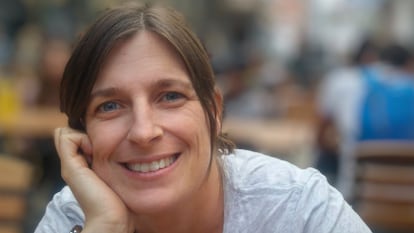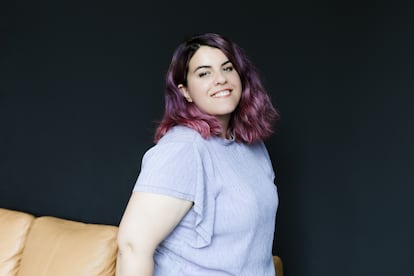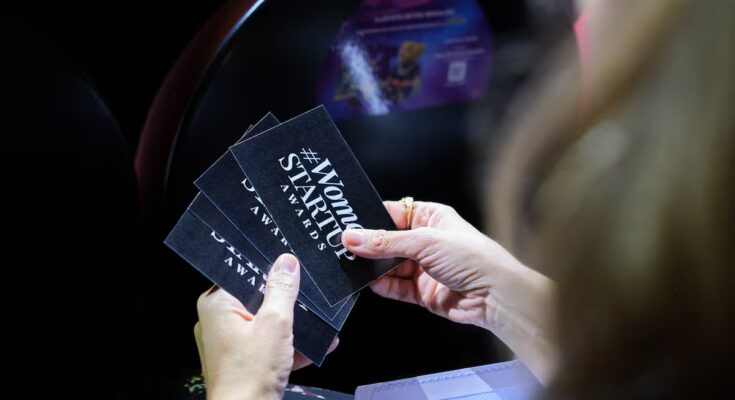During her degree project, Blanca Travesí, biomedical engineer, was lucky enough to have an unusual experience: developing practical research (in her case, on the quality of sleep in women with fibromyalgia treated with transcranial magnetic stimulation) which allowed her to work with patients and verify the real and direct impact of her commitment. This process – closer and more human than most academic work – led him to think about all the students who fail to apply what they learned in their TFG or TFM to a tangible context. If it had demonstrated how university research can improve lives, why do so many other jobs with potential end up forgotten in a random drawer?
Manuel Docavo, his partner, had had a similar experience with his own TFG, focusing on designing spare parts for water pumps in Benin and thus extending the life of wells. Something that made them both see the transformative potential of university projects when given the opportunity to direct them towards real needs. From that coincidence of points of view, his and Travesí’s, the idea of U4Impact was born: a platform that connects university talents with companies, administrations and foundations that seek innovative solutions to their challenges.
Spain, they recall, is the third country in the European Union with the highest number of unemployed graduates and, at the same time, almost half of the companies declare that they have difficulty finding qualified profiles. U4Impact was created precisely to reduce this distance, transforming the TFG and TFM into impact projects developed with the support of academic tutors and the direct involvement of those who need new ideas to overcome their challenges. They move above all between areas: engineering, digitalisation and technological innovation; business and marketing; work and social education.
Today, that initial push has grown into a network connecting hundreds of young people with organizations across the country; a path that led Travesí to become one of the finalists of the fourth edition of the Women Startup Awards, which reward, like every year, female talent in the entrepreneurial ecosystem. “There was a lot of female talent engaged but very little visibility. So we wanted to change that narrative by creating a space of celebration, not just denunciation,” says Elena Bienes, its organizer.
These awards, promoted by the Spanish Association of Startups and the Yellow agency, were born with a clear vocation: to make visible the women who lead change in a sector in which they continue to be a minority. Because, even if Spanish technological entrepreneurship has not stopped growing, the data undeniably shows a clear gender disproportion in the creation of emerging businesses; and that’s why they seek rewards make noise, pave the way and create more references for the girls and young women who come after. “Furthermore, we want the winners’ stories to continually inspire and serve as a mirror for other women,” adds Bienes, who believes that visibility is the first step towards structural change.
Entrepreneurship with gender gap
Despite progress, entrepreneurship is still more difficult for women. The figures confirm it: only 10% of startups They are the ones who found Spanish companies, according to the Entrepreneurship Map of the South Summit and IE University, and the protagonists confirm this: “There is a lack of references and support networks”, summarizes Travesí, who recalls the times in which she had to “explain her business model in environments where it is still surprising to see a woman in charge”.
For Nera González, head of Technovation Girls, the root lies in education: “Girls grow up thinking that mathematics is very difficult and that it is not for them; this means that there are fewer women in technology and, then, fewer leaders.” And Nerea Luis, co-founder of Lumi Labs, warns that biases don’t disappear even in the most innovative environments: “Technology is not neutral, and neither is entrepreneurship. If the teams aren’t diverse, the solutions won’t be either.” The three are among the finalists of this edition of the Women Startup Awards, who will be awarded on November 17th at the Teatros Luchana in Madrid.
María Benjumea, president of South Summit, agrees that the challenge is no longer in the talent, but in the structures that contain it: “The Spanish entrepreneurial ecosystem is evolving towards greater diversity, but the data continues to reflect the disparities,” she observed in a previous conversation with EL PAÍS. She also believes that equality will not be achieved with symbolic gestures, but with a real change of mentality: “Female leadership must be normalized: in classrooms, on boardrooms, in investments and in the media narrative.” Awards like the Women Startup Awards go in this direction, designed not to create a separate category, but so that one day “they will no longer be necessary because equality is, finally, a reality”, says Bienes. And he highlights a clear trend: “Now large companies, accelerators and investors consciously try to integrate female leadership. There is still a long way to go, but it is no longer perceived as a symbolic gesture, but as a real competitive advantage.”
Travesí, González and Luis represent three different ways of understanding entrepreneurship with the same common thread: the belief that education can and must be a driver of change. Travesí did this by uniting university and company so that academic works do not remain on empty paper; González, reawakening technological vocations among girls and teenagers who never thought they would see themselves programmed; and Luis, building bridges between artificial intelligence and classrooms so that technology stops being a mystery. Three trajectories that demonstrate that entrepreneurship can also be a way of teaching.
Academic works with practical applications
When Travesí talks about U4Impact, he does so with the quiet pride of someone who has seen his idea grow faster than expected. What started as a personal intuition now connects thousands of students with organizations seeking real solutions. “Young people don’t want to just do internships – they want to contribute and feel useful. And organizations need that fresh talent to innovate,” he explains. The platform has become a bridge where both sides meet: students apply their knowledge to real-world projects; they get a good grade (the average of their work is now 8.9); and entities benefit from new ideas that they may end up adopting.
The model may be simple, but its scope is not: since its creation, and thanks to agreements with more than 60 universities across Spain, U4Impact has promoted more than 500 jobs (between TFG and TFM) “and more than 150,000 hours of work contributing to the SDGs have been channeled”, responding to a different specific need in each case: reducing food waste, designing environmental measurement systems, improving healthcare or exploring digital solutions for inclusion, among others. many others. “We wanted to demonstrate that young talents are not a resource to be trained, but rather a transformative force in themselves,” says Travesí. His way of speaking, serene and enthusiastic at the same time, reveals that behind his business there is something more than simple management: a profound educational conviction that has to do with his own experience.
“In my first months, I had to explain the project in environments where no one expected a young woman leading a university innovation initiative,” she recalls. A constant exposure that forced her to gain certainty, but also to redefine her role: not only as an entrepreneur, but as a mediator between worlds that hardly communicate. For this reason he insists on the fact that education, rather than context, is the essence of the project: “U4Impact not only helps young people take their first steps in the world of work, but invites them to look at problems outside the classroom and to understand that their knowledge has value if it is put at the service of others”.

When a girl discovers she knows how to program
Nera González loves to say it Tech girls It doesn’t teach how to program, but rather how to look at the world with different eyes. From Power to Code, the association that coordinates the program in Spain, leads an initiative that every year brings together thousands of girls between 8 and 18 years old to design applications with social impact, even if they are not interested in the final result: “Our product is not the applications or the projects, it is the girls,” she says smiling.
Therefore, for 12 weeks, participants learn to identify a problem in their environment and create a technological solution as a team, always guided by volunteer mentors. “You have to learn by doing and you can’t love what you don’t know,” repeats González, convinced that the first step to closing the gender gap in technology is to offer early experiences of discovery and purpose.
The initiative, free and open to all types of profiles, has grown to more than 1,500 participants in Madrid alone. In it the girls tackle topics such as the loneliness of the elderly or mental health, and in doing so they learn much more than simple programming: “When they understand that technology can serve to improve the lives of others, creativity is unleashed,” she says. Therefore, what begins as a game often becomes a calling. “They see themselves empowered to use the technology (…), and the following year they might participate in other programs, camps or scholarships, and so we see how the seed is germinating.” In an industry where only 13% of professionals are women, Tech girls It shows that change starts in the classroom and with a girl discovering that yes, she can code too.

The ethics of algorithms begins in the classroom
Doctor of Computer Science and co-founder of Lumi Labs, Nerea Luis has been trying for years to make artificial intelligence no longer seem like magic. His company develops artificial intelligence solutions with an ethical and pedagogical approach, collaborating with educational centers, universities and organizations seeking to better understand this technology. “AI doesn’t have to be a black box: you have to teach how it works so that people trust it,” he explains. His vision involves digital literacy that is not limited to the use of tools, but rather teaches how to think: “It’s not just about using ChatGPT (or any other program), but about understanding what’s behind it and how it can help us think better.”
Luis combines awareness raising with consultancy and teaching and all its aspects share a common thread: making technology more understandable, accessible and equitable. “AI doesn’t have to be a black box: you have to teach how it works so that people trust it,” he warns. In his seminars and lectures, he also insists that future professionals must learn to question the biases, impacts and consequences of what they create: “21st century digital literacy is not just about programming, but about understanding the impact our decisions have on the systems we design,” he adds. And in that critical and pedagogical vision lies the essence of his project: an artificial intelligence at the service of consciousness and knowledge.



